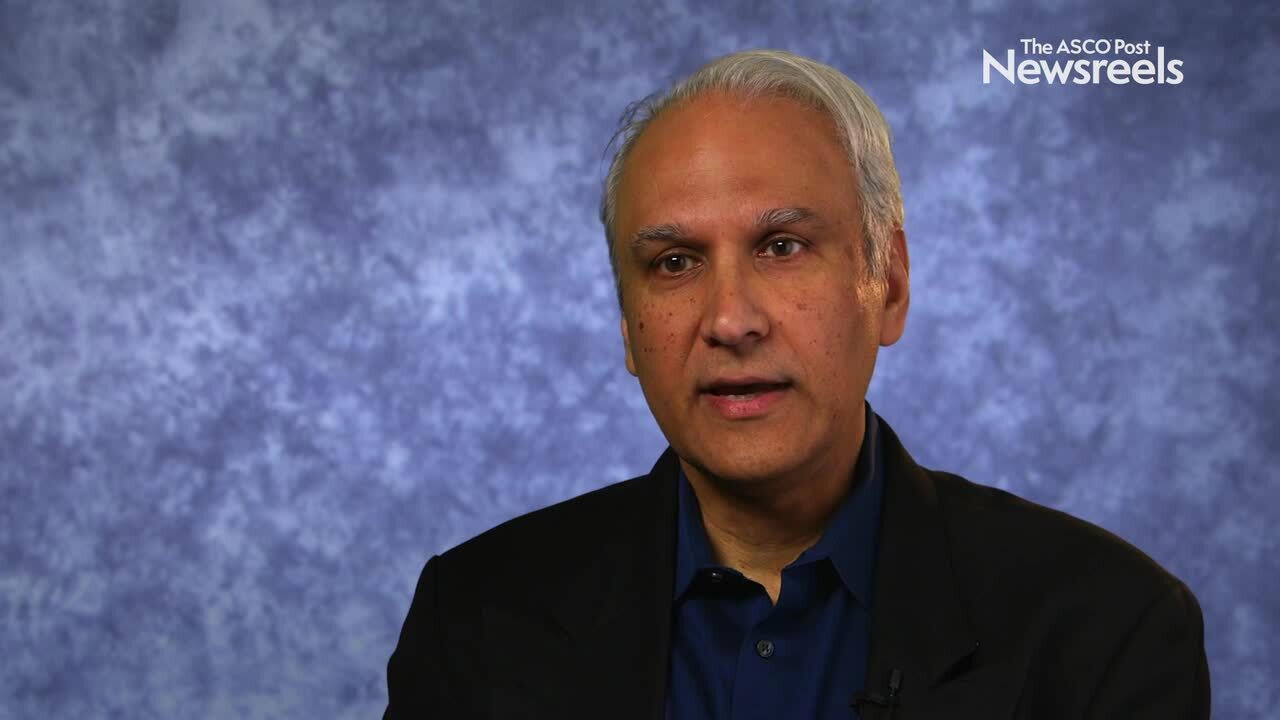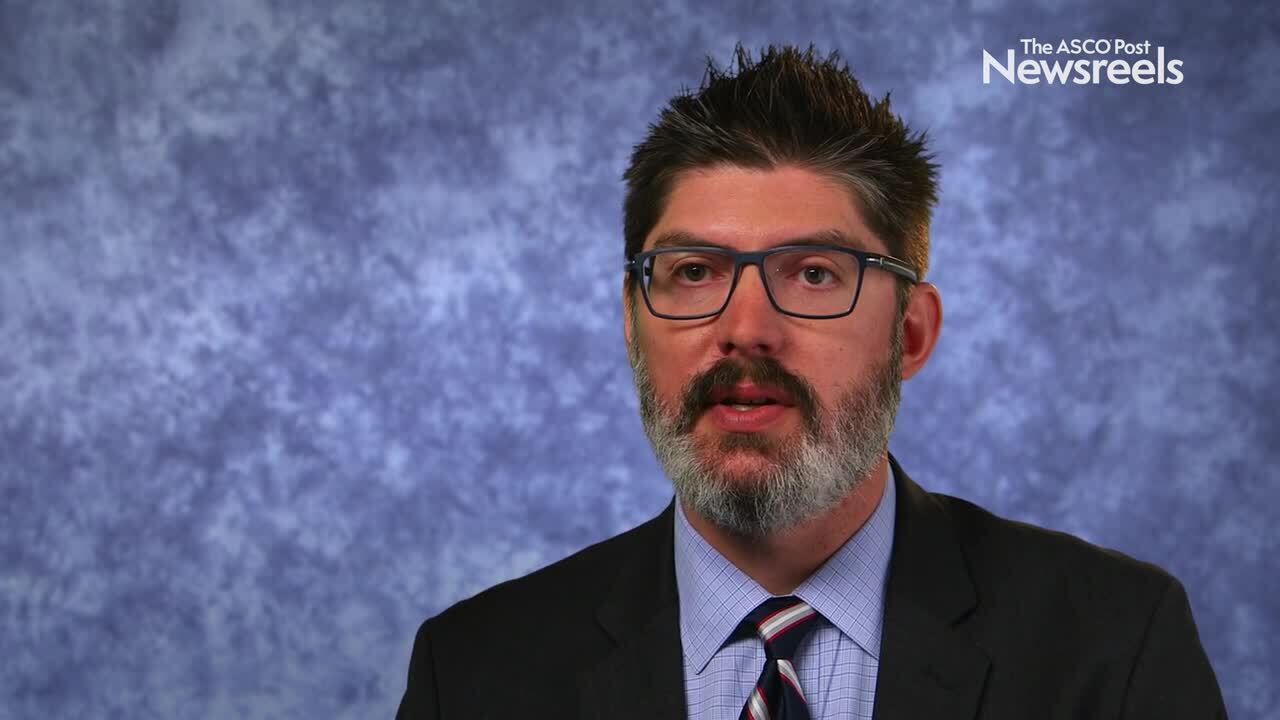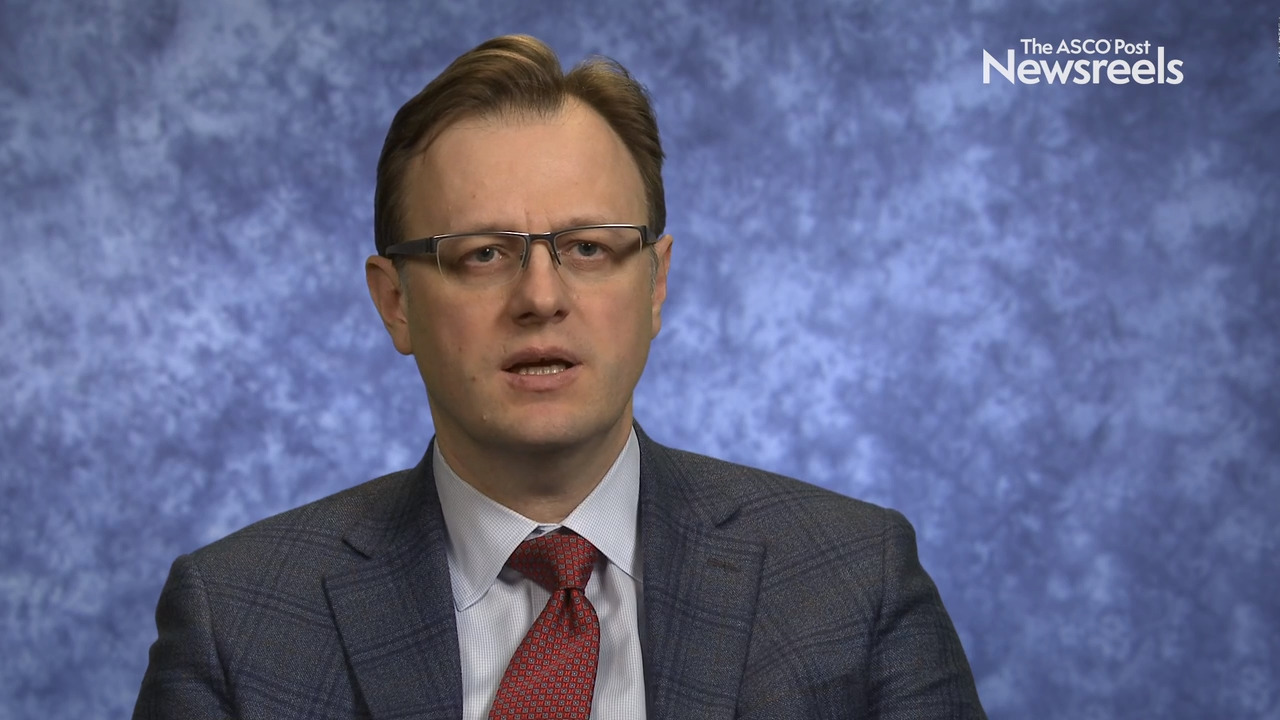FDA Approves Chemotherapy-Free Regimen, Venetoclax Plus Obinutuzumab, as First-Line Treatment for CLL/SLL
The U.S. Food and Drug Administration (FDA) has approved venetoclax (Venclexta) in combination with obinutuzumab (Gazyva) for the treatment of people with previously untreated chronic lymphocytic leukemia (CLL) or small lymphocytic lymphoma (SLL). The approval is based on the results of the...
FDA Pipeline: Applications and Designations in Prostate Cancer, Leukemia, and HER2-Positive Cancers
In the past 2 weeks, the U.S. Food and Drug Administration (FDA) accepted a new drug application and granted Priority Review for a prostate cancer treatment, granted Orphan Drug designation to a treatment for acute lymphoblastic leukemia, accepted an investigational new drug application for a...
FDA Approves First-Line Ivosidenib for IDH1-Mutated AML
On May 2, the U.S. Food and Drug Administration (FDA) expanded its approval of ivosidenib (Tibsovo) to include newly diagnosed acute myeloid leukemia (AML) with a susceptible IDH1 mutation, as detected by an FDA-approved test, in patients who are at least 75 years old or who have comorbidities that ...
Long-Term Follow-up: Addition of Idelalisib to Rituximab in Relapsed Chronic Lymphocytic Leukemia
In an article published in the Journal of Clinical Oncology, Sharman et al provided long-term findings of a phase III trial that examined the addition of idelalisib to rituximab in relapsed chronic lymphocytic leukemia (CLL), including findings from an extension phase of idelalisib monotherapy. The ...
Intermittent vs Intensive PEG-Asparaginase in Pediatric Acute Lymphoblastic Leukemia
In a Scandinavian study reported in the Journal of Clinical Oncology, Albertsen et al found that use of intermittent vs intensive pegylated (PEG)-asparaginase was associated with similar efficacy and reduced asparaginase-related toxicity in pediatric acute lymphoblastic leukemia (ALL). The study...
Tale of Two FLT3 Inhibitors in AML: Gilteritinib and Quizartinib
Data supporting the use of FLT3 inhibitors in patients with acute myeloid leukemia (AML) were featured at the 2018 ASH Annual Meeting & Exposition. Gilteritinib was evaluated in combination with induction and consolidation as front-line therapy in newly diagnosed patients with AML,1 and...
Phase III Data Support Use of Gilteritinib in Relapsed or Refractory FLT3-Mutated AML
Treatment with gilteritinib, an oral type 1, FLT inhibitor, significantly improved overall survival compared with chemotherapy in patients with FLT3-positive relapsed or refractory acute myeloid leukemia (AML), according to the final results of the phase III ADMIRAL trial.1 The longest survival for ...
FDA Pipeline: Designations for Myelodysplastic Syndromes, Triple-Negative Breast Cancer, AML, and EBV-Associated Cancers
Over the past week, the U.S. Food and Drug Administration (FDA) granted several Fast Track and Orphan Drug designations to treatments for myelodysplastic syndromes, triple-negative breast cancer, acute myeloid leukemia (AML), and Epstein-Barr virus (EBV)-associated cancers. Fast Track Designation...
FDA Pipeline: Designations in Glioblastoma, Neurofibromatosis, Multiple Myeloma, and AML
This week, the U.S. Food and Drug Administration (FDA) granted designations for treatments for recurrent glioblastoma, neurofibromatosis type 1 and plexiform neurofibromas, multiple myeloma, and relapsed or refractory FLT3-ITD acute myeloid leukemia (AML). Fast Track Designation for Ad-RTS-hIL-12...
AACR 2019: Gilteritinib in Patients With FLT3-Mutated Acute Myeloid Leukemia
Treatment with the FLT3-targeted therapeutic gilteritinib improved survival for patients with relapsed or refractory acute myeloid leukemia (AML) harboring an FLT3 mutation compared with standard chemotherapy regimens, according to results from the phase III ADMIRAL trial presented by Perl et al at ...
FDA Pipeline: Mammography Policies, Designations for Leukemias and Myelodysplastic Syndrome
This week, the U.S. Food and Drug Administration (FDA) announced policy changes to modernize mammography policies and issued a Breakthrough Therapy designation, an Orphan Drug designation, and an investigational new drug application. FDA Advances Policy Changes to Modernize Mammography Services...
Venetoclax Plus Low-Dose Cytarabine in Older Patients With Previously Untreated AML Ineligible for Intensive Chemotherapy
In a phase Ib/II trial reported in the Journal of Clinical Oncology, Wei et al found that the combination of venetoclax and low-dose cytarabine produced a high response rate in previously untreated older patients with acute myeloid leukemia (AML) who were ineligible for intensive chemotherapy. In...
Neil P. Shah, MD, PhD, on CML: NCCN Guidelines Updates on Discontinuing Tyrosine Kinase Inhibitor Therapy
Neil P. Shah, MD, PhD, of the UCSF Helen Diller Family Comprehensive Cancer Center, discusses the feasibility of discontinuing tyrosine kinase inhibitor therapy in select patients with chronic phase chronic myeloid leukemia outside of clinical trials.
Frederick L. Locke, MD, on Innovative CAR-T Cell Therapies: The Patient Experience
Frederick L. Locke, MD, of the H. Lee Moffitt Cancer Center and Research Institute, discusses recent approvals of chimeric antigen receptor T-cell therapies in leukemia and lymphoma, and how clinicians are using infrastructure, navigation, and early referrals to maximize response and minimize toxicity.
FDA Pipeline: Assay Approval, Breakthrough Designations for AI Technology and CLL, and More
In the past week, the U.S. Food and Drug Administration (FDA) approved a companion diagnostic assay, granted Breakthrough Device and Breakthrough Therapy designations, and extended the review period of a proposed treatment. The agency also published four draft guidances and one final guidance...
Effect of Hematopoietic Stem Cell Transplantation on Outcome in Pediatric Hypodiploid B-ALL
In a report from the Children’s Oncology Group (COG) in the Journal of Clinical Oncology, McNeer et al found that hematopoietic stem cell transplantation (HSCT) did not improve outcomes in pediatric patients with hypodiploid B-lymphoblastic leukemia (B-ALL). Study Details The study was a...
FDA Pipeline: Updates on Treatments for Cervical Cancer, Myelofibrosis, Chemotherapy-Induced Nausea and Vomiting, and More
The FDA recently issued announcements on a Fast Track designation, a Priority Review, two supplemental new drug applications, an investigational new drug application, and a marketing clearance. The agency also released a safety communication on cancer-related surgery. Fast Track Designation for...
Stefan O. Ciurea, MD, on Infusing High Doses of Natural Killer Cells: An Enhanced Antitumor Effect
Stefan O. Ciurea, MD, of The University of Texas MD Anderson Cancer Center, discusses the enhanced antitumor effect and lower viral reactivation that result from high doses of natural killer cells infused after haploidentical transplantation, with no excess graft-vs-host disease, a low relapse rate for high-risk acute myeloblastic leukemia, and a low incidence of viral reactivation (Abstract 74).
Update on FDA-Approved CAR T-Cell Products
TISAGENLECLEUCEL IS an anti-CD19 chimeric antigen receptor (CAR) T-cell product approved by U.S. Food and Drug Administration to treat selected hematologic malignancies.1,2 To appreciate the clinical trial findings summarized here, from selected abstracts presented at the 2018 American Society of...
Highlights From the 2018 ASH Annual Meeting & Exposition
TO ADD to our ongoing coverage of the 2018 American Society of Hematology (ASH) Annual Meeting & Exposition, we bring readers of The ASCO Post these summaries of an assortment of interesting studies. They focus on novel therapies under investigation in the treatment of acute lymphoblastic...
FDA Pipeline: Priority Reviews in Solid Tumors and Lymphoma; Plus an sNDA in Acute Myeloid Leukemia
Over the past week, the U.S. Food and Drug Administration (FDA) granted multiple Priority Reviews and accepted a supplemental new drug application: Priority Review for Entrectinib in NTRK Fusion–Positive Solid Tumors and Metastatic, ROS1-Positive NSCLC This week, the FDA accepted new drug...
ERG Gene Variations and Risk of ALL in Hispanic Children
Scientists have identified genetic variations in a fourth gene that are associated with an increased risk of acute lymphoblastic leukemia (ALL) in Hispanic children. These findings were published by Qian et al in Blood. The gene is ERG, a transcription factor that is also...
FDA Approves Ibrutinib in Combination With Obinutuzumab in Treatment-Naive CLL/SLL
ON JANUARY 28, 2019, the U.S. Food and Drug Administration (FDA) approved ibrutinib (Imbruvica), a Bruton’s tyrosine kinase inhibitor, in combination with obinutuzumab in treatment-naive patients with chronic lymphocytic leukemia/small lymphocytic lymphoma (CLL/SLL). This is the first approval of...
Data Mount for Venetoclax as Add-on Therapy in Acute Myeloid Leukemia
The benefit of adding venetoclax to a hypomethylating agent or low-dose cytarabine in the front-line treatment of acute myeloid leukemia (AML) was evident from a number of studies reported at the 2018 American Society of Hematology (ASH) Annual Meeting & Exposition (see Table 1). For elderly...
Treatment Outcomes for Children With Hypodiploid Acute Lymphoblastic Leukemia
In a retrospective study reported in the Journal of Clinical Oncology, Pui et al found that minimal residual disease (MRD)-negative status, high hypodiploidy with 44 chromosomes, and MRD-stratified treatment were associated with improved outcomes among children treated for newly diagnosed...
FDA Approves Ibrutinib in Combination With Obinutuzumab in Treatment-Naive CLL/SLL
Today, the U.S. Food and Drug Administration (FDA) approved ibrutinib (Imbruvica), a Bruton's tyrosine kinase inhibitor, in combination with obinutuzumab in treatment-naive patients with chronic lymphocytic leukemia/small lymphocytic lymphoma (CLL/SLL). This is the first approval of a...
Combination Azacitidine and Lenalidomide as Salvage Therapy for Relapsed AML After Allogeneic Stem Cell Transplantation
In a phase I trial reported in the Journal of Clinical Oncology, Craddock et al found evidence that the sequential combination of azacitidine and lenalidomide may be an effective salvage therapy in patients with acute myeloid leukemia (AML) relapsing after allogeneic stem cell transplantation...
Expert Point of View: Elihu H. Estey, MD; Steven Gore, MD; and Mark J. Levis, MD, PhD
ELIHU H. ESTEY, MD, Professor of Medicine at the University of Washington and Director of Acute Myeloid Leukemia (AML) Clinical Research at the Fred Hutchinson Cancer Research Center, Seattle, added that with these “robust” outcomes, future trial patients may “not be eager to wind up in the...
Use of Isocitrate Dehydrogenase Inhibitors in Induction Therapy for Newly Diagnosed AML
IN AN OPEN-LABEL phase I study of 153 patients newly diagnosed with acute myeloid leukemia (AML) and mutations in isocitrate dehydrogenase-1 (IDH1) or IDH2, treatment with standard chemotherapy plus the oral IDH inhibitors ivosidenib and enasidenib led to high response rates and possibly impressive ...
Expert Point of View: Joseph Mikhael, MD
JOSEPH MIKHAEL, MD, press conference moderator where these data were discussed, commented on the BEAT AML trial: “One of the greatest challenges in the concept of personalized medicine is that by the time you determine what is right for a patient [ie, genomic analysis], the horse is out of the...
BEAT AML Umbrella Trial: Bringing Personalized Medicine to Acute Myeloid Leukemia
THE MULTIARM, multicollaborative BEAT AML umbrella trial demonstrated the feasibility of using next-generation sequencing to assign treatment tailored to individual genomics of elderly patients with acute myeloid leukemia (AML) within 7 days. This may prove to be a major advance, since typically...
Newly Defined Subtypes of B-Cell Acute Lymphoblastic Leukemia
Investigators have identified multiple new subtypes of the most common childhood cancer, B-cell acute lymphoblastic leukemia (ALL)—research that has the potential to improve the diagnosis and treatment of high-risk patients. Researchers used integrated genomic analysis, including...
Remnants of Cancer Remain, but Demons Are Now Gone
In the summer of 2002, I was a physically active 17-year-old boy on the cusp of adulthood. I was about to enter my senior year in high school, and like other teens my age, I was excited about college and the promise of the undreamed-of opportunities that lay ahead. At first, the lethargy I was...
Study Finds Elevated Risk of MDS and AML After Chemotherapy for Most Solid Tumors
Findings from a new study by researchers at the National Cancer Institute (NCI) show that patients treated with chemotherapy for most solid tumors from 2000 to 2014 experienced an increased risk of therapy-related myelodysplastic syndrome/acute myeloid leukemia (MDS/AML). The study, which used U.S. ...
FDA Expands Indication for Dasatinib to Pediatric Patients With Ph+ ALL in Combination With Chemotherapy
On January 2, the U.S. Food and Drug Administration (FDA) expanded the indication for dasatinib (Sprycel) tablets to include the treatment of pediatric patients 1 year of age and older with newly diagnosed Philadelphia chromosome–positive (Ph+) acute lymphoblastic leukemia (ALL) in...
Priority Review for Quizartinib in Relapsed or Refractory FLT3-ITD–Positive AML
THE U.S. FOOD AND DRUG ADMINISTRATION (FDA) accepted a new drug application and granted Priority Review to quizartinib, a FLT3 inhibitor, for the treatment of adult patients with relapsed or refractory FLT3-ITD–positive acute myeloid leukemia (AML). The FDA is expected to make a decision on...
Venetoclax in Combination Regimens for Older Patients With AML or Those With Comorbidities Precluding Intensive Induction
On November 21, 2018, venetoclax (Venclexta) was granted accelerated approval for use in combination with azacitidine or decitabine or low-dose cytarabine for the treatment of newly diagnosed acute myeloid leukemia (AML) in patients aged ≥ 75 years or who have comorbidities that preclude the use of ...
FDA Approves Calaspargase Pegol-mknl for Pediatric and Young Adult Patients With ALL
On December 20, 2018, the U.S. Food and Drug Administration (FDA) approved calaspargase pegol-mknl (Asparlas), an asparagine-specific enzyme, as a component of a multiagent chemotherapeutic regimen for acute lymphoblastic leukemia (ALL) in pediatric and young adult patients aged 1 month to...
Fixed-Duration Venetoclax Plus Rituximab in Relapsed or Refractory CLL
In patients with relapsed or refractory chronic lymphocytic leukemia (CLL), fixed-duration venetoclax -(Venclexta) combined with rituximab (Rituxan) reduced the risk of disease progression or death compared with standard-of-care bendamustine/rituximab, according to longer-term follow-up of the...
Early Studies of Ibrutinib Plus CAR T-Cell Combination in Chronic Lymphocytic Leukemia
Researchers are combining chimeric antigen receptor (CAR) T-cell therapy with ibrutinib (Imbruvica) as a means of augmenting and deepening responses in patients with relapsed or refractory chronic lymphocytic leukemia (CLL). Two pilot studies presented at the 2018 American Society of Hematology...
Nuclear Excision Repair as a Possible Predictor of Early Relapse in Pediatric ALL
Researchers recently discovered that by testing the level of nucleotide excision repair (NER) gene expression, pediatric oncologists may be able to determine the likelihood of early relapse (less than 3 years) in patients with acute lymphoblastic leukemia (ALL). These findings were published by...
First-Line Ibrutinib With or Without Rituximab vs Rituximab/Bendamustine in Older Patients With CLL
In a phase III trial reported at the recent American Society of Hematology Annual Meeting & Exposition and in The New England Journal of Medicine by Woyach et al, ibrutinib (Imbruvica) and ibrutinib/rituximab (Rituxan) were associated with superior progression-free survival vs...
First-Line Ibrutinib/Rituximab Combination Shows Benefit for Younger Patients With CLL
First-line therapy with the combination of ibrutinib (Imbruvica) and rituximab (Rituxan) reduced disease progression by two-thirds compared with standard chemotherapy using fludarabine, cyclophosphamide, and rituximab (FCR) in younger patients with chronic lymphocytic leukemia (CLL), according to...
MURANO Trial Follow-up: MRD and Prognosis With Fixed Duration of Venetoclax/Rituximab in Relapsed or Refractory CLL
As reported in the Journal of Clinical Oncology by Kater et al, high undetectable minimal residual disease (MRD) rates persisted after the end of venetoclax (Venclexta)/rituximab (Rituxan) treatment in the phase III MURANO trial in relapsed or refractory chronic lymphocytic leukemia (CLL), and were ...
Reducing Infections in Patients With AML Receiving Induction and Reinduction Chemotherapy
In a report in the Journal of Oncology Practice, Morris et al described an initiative that has been successful in reducing the incidence of invasive fungal infections in patients with acute myeloid leukemia (AML) receiving induction and reinduction therapy at the University of Virginia Health...
FDA Pipeline: New Priority Reviews, Designations, and Clearances, Plus Statements on Genetic Testing and Class Labeling
The U.S. Food and Drug Administration (FDA) recently issued the following new approvals and designations: Priority Review for Atezolizumab in Combination With Chemotherapy for the Initial Treatment of Extensive-Stage SCLC The FDA accepted a supplemental biologics license application...
Moxetumomab Pasudotox-tdfk for Relapsed or Refractory Hairy Cell Leukemia
ON SEPTEMBER 13, 2018, moxetumomab pasudotox-tdfk (Lumoxiti), a CD22-directed cytotoxin, was approved for the treatment of adult patients with relapsed or refractory hairy cell leukemia who received at least two prior systemic therapies, including with a purine nucleoside analog.1,2 Supporting...
Duvelisib for Relapsed or Refractory CLL/SLL and for Relapsed or Refractory Follicular Lymphoma
In the Clinic provides overviews of novel oncology agents, addressing indications, mechanisms of action, administration recommendations, safety profiles, and other essential information needed for the appropriate clinical use of these drugs. On September 24, 2018, duvelisib (Copiktra) was granted...
Expert Point of View: Susan M. O’Brien, MD
THE STUDY’S discussant, Susan M. O’Brien, MD, Associate Director for Clinical Science, Chao Family Comprehensive Cancer Center, University of California Irvine Health, said the results of the Alliance North American Intergroup Study A041202—demonstrating that ibrutinib (Imbruvica) is more...
Ibrutinib vs Standard of Care in Front-Line Treatment of Older Patients With Chronic Lymphocytic Leukemia
IBRUTINIB (IMBRUVICA) as a front-line agent proved superior to standard-of-care chemoimmunotherapy for chronic lymphocytic leukemia (CLL) in older patients in A041202, an Alliance-led National Clinical Trials Network study.1 At a follow-up of 38 months, the median progression-free survival was not ...



